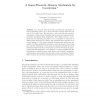Free Online Productivity Tools
i2Speak
i2Symbol
i2OCR
iTex2Img
iWeb2Print
iWeb2Shot
i2Type
iPdf2Split
iPdf2Merge
i2Bopomofo
i2Arabic
i2Style
i2Image
i2PDF
iLatex2Rtf
Sci2ools
103
click to vote
GECCO
2003
Springer
2003
Springer
A Game-Theoretic Memory Mechanism for Coevolution
One problem associated with coevolutionary algorithms is that of forgetting, where one or more previously acquired traits are lost only to be needed later. We introduce a new coevolutionary memory mechanism to help prevent forgetting that is built upon game-theoretic principles, specifically Nash equilibrium. This “Nash memory” mechanism has the following properties: 1) It accumulates a collection of salient traits discovered by search, and represents this collection as a mixed strategy. 2) This mixed strategy monotonically approaches the quality of a Nash equilibrium strategy as search progresses, thus acting as a “ratchet” mechanism. 3) The memory naturally embodies the result (solution) obtained by the coevolutionary process. 4) The memory appropriately handles intransitive cycles (subject to resource limitations). We demonstrate our Nash memory using Watson and Pollack’s intransitive numbers game, and compare its performance to the conventional “Hall of Fame” memory ...
| Added | 06 Jul 2010 |
| Updated | 06 Jul 2010 |
| Type | Conference |
| Year | 2003 |
| Where | GECCO |
| Authors | Sevan G. Ficici, Jordan B. Pollack |
Comments (0)

